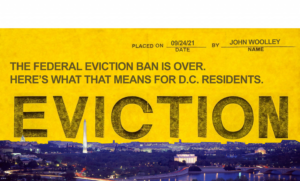A new report from Georgetown’s McCourt School of Public Policy on evictions filed and executed between 2014 and 2018 gives the latest insight into vast racial and economic disparities in the D.C. housing market, which is among the most expensive in the country.
According to the report, economic difficulties caused by the pandemic only threaten to worsen the preexisting housing instability in the District, where eviction is a looming threat for many of D.C.’s low-income residents. Nearly half of the Districts 163,000 renter households fall into the category of “rent-burdened,” defined as spending over 30 percent of their household income on rent, and almost a quarter of renters spend over half of their income on rent.
Eva Rosen, assistant professor at Georgetown’s McCourt School of Public Policy, and Brian McCabe, associate professor of sociology in the College, authored the report and recommended proposals for short and long-term strategies to promote greater housing stability.
In the period studied, courts received an average of 32,000 eviction filings annually, encompassing roughly 18,000 unique households. Serial filings against those households make up part of the total number. The most commonly stated reason for these filings is the nonpayment of rent, making up 93 percent of the annual totals. The average amount owed at the time of filing totals was just $1,207, less than the median monthly rent of $1,487 across the District.
The high rate of eviction filings may be attributed to the low cost of filing for D.C. landlords, which at $15 is the lowest rate of any major American city. The report traced nearly half of evictions in the District 2018 to only 20 landlords, who own just 21 percent of all rental units and often file large swaths of evictions. The report also draws attention to the practice some landlords employ of filing multiple eviction notices for a single household in succession as a method of rent collection.
As only 5.5 percent of eviction filings are executed, the majority of filings are thought to be used as a way of pressuring tenants into paying overdue rent. The 5.5 percent represents only formal evictions recorded in court filings, and thus leaves out other ways in which renters may be forced from their homes, such as those who move under pressure after receiving one or more eviction filings.
The burden of evictions falls along racial lines, and areas in D.C. with higher numbers of Black residents face a higher percentage of eviction filings, according to the report. As the report states, “Limiting eviction filings and keeping tenants in their homes is a central racial justice issue for Washington, D.C.”
In 2018 alone, 11 out of every 100 D.C. renter households received an eviction filing. However, the eviction filing rate wasn’t geographically even across the District’s wards—in the predominantly-Black Ward 8, 25 percent of renter households received a filing compared to fewer than three percent in predominantly-white Ward 2. According to the report, this disparity across wards stretches to include the numbers of evictions actually carried out, 13 times higher in Ward 8 than Ward 2.
The extent of D.C.’s renting problem is also shown through what happens when these tenants show up in court. The report found “more than 98 percent of tenants in DC served an eviction filing navigate the process without the formal assistance of an attorney.” Despite the low average amounts of money owed by renters, court fees and demands on time continually raise the cost of these proceedings.
Though the District offers public housing and some housing voucher programs (though undocumented families and those with a criminal background may be disqualified), housing subsidies have not been widespread enough to alleviate the problem, and other measures such as rent-controlled properties are unlikely to expand quickly.
While the pandemic has only increased the stakes, it has also encouraged the city to take action to prevent evictions. On March 17, the D.C. Council voted to ban landlords from filing evictions or issuing notices of eviction until 60 days after the public health emergency ends. Mayor Muriel Bowser recently extended the public health emergency in response to the pandemic until December 31, ensuring a moratorium on evictions until the end of February 2021.
Nonetheless, despite the ban on eviction filings, some landlords continued to send invalid eviction notices to tenants in spite of the moratorium. Though unenforceable, these notices still have caused confusion about the policy and even led some tenants to move out. The confusion caused by these notices could be especially harmful among undocumented renters and non-native English speakers and poses a threat to the housing stability of families in the District.
The report, warning of the added pressures of COVID-19, also outlined a series of proposals for improving the rental situation, including: raising the cost of eviction filings, banning evictions concerning rent under a certain threshold, and banning lease language that required tenants to waive their right to a 30-day notice of an eviction filing.
The recommendations go beyond landlord interventions as well, calling for the sealing of eviction records, which are currently publicly available and may promote eviction stigma. The report also advised the extension of the eviction moratorium throughout the pandemic recovery period, as well as advocating for emergency rental assistance in the short-term.
The D.C. Council recently incorporated some of these strategies into new legislation, mandating courts to seal eviction records of unexecuted evictions after 30 days, or sooner at the court’s discretion. Records of executed evictions will also be sealed after three years. Landlords must inform housing applicants of the criteria they evaluate when deciding and may not ask about prior eviction records. The bill also seeks to limit serial filing by disallowing eviction filings for amounts under $600 and requiring 30 days notice for tenants, whether or not this was included in their lease.
Rosen and McCabe emphasized, however, that expanded subsidized housing and housing vouchers are some of the only ways to create long-term stability in the face of yawning disparities and current economic strain. They emphasized that evictions are determining factors, leading to increased unemployment, possible homelessness, and worse health outcomes. “Eviction is not only a condition of poverty; it is also a cause of it.”





